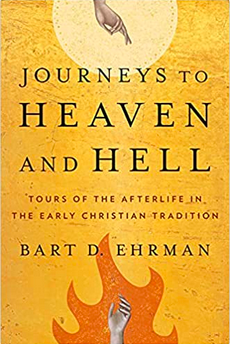
By Rabbi Dr. Israel Drazin
Journeys to Heaven and Hell by Bart D. Ehrman, a highly respected New Testament scholar, tells some of the different notions various nations and people had about the afterlife in ancient times. He describes a wide variety of katabases and anabases, but not all.
Katabasis means going down, a descent. It is used to describe a journey to the underworld. Its ancient usage in Greek mythology told of a person’s visit to the world known as Hades. Ancient examples include Orpheus, who goes down to Hades in a failed attempt to bring his lover, Eurydice, back to the world of the living, Psyche’s journey to regain the love of Eros (Cupid), and Odysseus, who travels there during his trip home after the Trojan war to consult with the prophet Tiresias. Also, Aeneas who looks for his father Anchises to learn prophecies concerning his fate and that of the Roman Empire.
Anabasis is the opposite of katabasis. It denotes going up. The most famous ancient narratives of anabases are Persephone, who travels back and forth from Hades every year, and Xenophon’s anabasis, the account of the 10,000 goings-up to the sea.
Professor Ehrman introduces us to the katabases in Homer, Virgil, Aristophanes, Lucian, Apocalypse of Paul, I Enoch, and more. He admits that it is impossible to know whether the authors of these ancient works believed they were true, that their description of the “underworld” was correct, or if they wrote their books as fiction. Either way, the books strongly impacted many people who believed what was written in whole or part and molded their behavior based on these beliefs. Many ancient as well as many modern thinkers felt and still feel that if heaven and hell do not exist, if God will not reward good conduct and punish wrong behavior, there is no reason to be moral, people can behave as they want.
Ehrman’s book has six chapters. In the first three, he examines Greek, Roman, Jewish, and Christian writings and compares them with others. In the last three chapters, he examines two Christian texts edited by scribes to make them more rational and acceptable to readers.
What is the view of the afterlife in the Hebrew Bible?
Several facts stand out. First, the Hebrew Bible, the Torah, has no mention or even hint that dead humans go to heaven or hell. The Torah mentions that the dead go to Sheol. This word means the grave. Some verses in the late book of Daniel are the closest to the idea of an afterlife, but most scholars dispute that this interpretation is true.
The biblical book of Ecclesiastes expresses the ancient Jewish view. In 3:19-20, it states, “For, in respect of the fate of man and the fate of beast, they have the same fate: as the one dies so dies the other, and both have the same life breath; man has no superiority over the beast, since both amount to nothing. Both go to the same place; both came from dust, and both return to dust.”
Second, it was not until the early second century BCE that a Jewish book speaks of an afterlife. This occurs in the post-biblical book I Enoch. But, as Ehrman states, we have no idea whether the authors of these books believed what they wrote was true.
Thirdly, the idea that God will reward good conduct and punish evil is widespread today among many Jews and non-Jews, as is the notion that if there is no heaven and hell, people can do what they will without concern for consequences.
This third idea is wrong. Even if heaven and hell do not exist, people will be hurt if they misbehave. The world is created with consequences for good and bad behaviors. Even if God does not award and punish, nature generally does.
Although there is no proof of heaven and hell, many philosophers and clergy teach the idea of reward and punishment. They do so because of what Plato called a “noble lie,” and Maimonides called an “essential truth” to help people feel good and control their behavior.
Rabbi Dr. Israel Drazin is a retired brigadier general in the U.S. Army chaplain’s corps and the author of more than 50 books. Republished from San Diego Jewish World which, along with The Moderate Voice, is a member of the San Diego Online News Association.
















